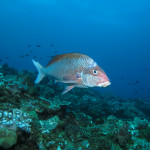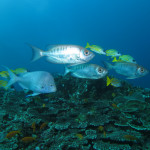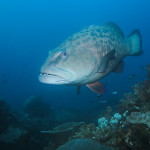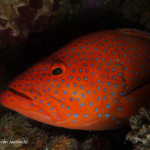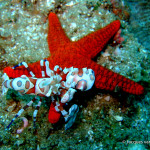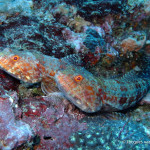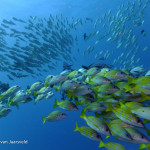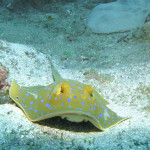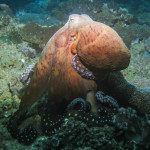As the rolling farmland of the Transkei began to give way to the lush green of KwaZulu-Natal’s sprawling sugarcane plantations, the feeling of being on vacation finally started to sink in. By that time, we had been in the car for seven hours, but the sight of the blue sea spreading out before us was enough to breathe life back into our adventure. I rolled the window down and took a deep breath of salty air.
It took another four hours after that first glimpse of the ocean to reach our destination. By the time we approached the turn-off to Sodwana Bay, we were almost at the Mozambican border and dusk had begun to settle over the arid bush on either side of the road. As we pulled into our hotel for the next four nights, my excitement reached fever pitch — we were in the tiny town that serves as the gateway to the jewel in South Africa’s diving crown.
Part of the iSimangaliso Wetland Park, Sodwana Bay is home to 31 miles (50 km) of underwater habitat that constitutes one of the world’s most southerly tropical reef systems. In 2000, the bay became internationally known after a group of technical divers rediscovered the prehistoric coelacanth in the depths of the park’s Jesser Canyon, but it is for the incredible biodiversity of the area’s shallower reefs that most divers flock to Sodwana Bay. No fewer than 1,350 species call the reef home, and divers can expect to see around 60 on any given dive.
I first dived Sodwana in 2013, but this time, we dove with local operator Adventure Mania on the recommendation of a good friend who assured my husband and I of the company’s welcoming atmosphere and innate professionalism. After Adventure Mania’s owner, Jacques, called to confirm our dive time for 6:30 the next morning, we spent the rest of the evening prepping camera gear and toasting our return to paradise with a barefoot meal at gourmet local restaurant The Lighthouse.
Six o’clock came around quickly. We woke to the soft gray light of dawn seeping through our bedroom curtains, then packed the car for the short drive through the coastal forest to the park gates. We paid our modest entrance fee, then parked our car near a family of mongooses playing in the sand.
Like all Sodwana dive charters, Adventure Mania sets up camp every morning beneath the shade of a glorified beach gazebo. As we approached, we were greeted by Jacques and his wife Amanda with such genuine warmth that I knew we’d made the right choice of operator. Adventure Mania prides itself on a personal touch, with either Jacques or Amanda leading every dive. Jacques also skippers the boat, leaving it in the capable hands of top-man Sipho while he is underwater.
After gearing up, Amanda gave a briefing on our first dive site. Sodwana’s reefs are named according to their distance from shore — Two Mile, Five Mile, Seven Mile and so on, each of which boasts its own number of individual sites. That morning we were headed for Antons, a popular spot on Two Mile Reef, known for large reef fish. We gathered with our fellow divers at the waterline, as Jacques and Sipho used a tractor to push the dive boat into water deep enough for it to float.
As we donned our lifejackets and prepared for the launch, Jacques took the wheel and reached under the console to switch on his waterproof stereo. The opening riffs of AC/DC’s ‘Thunderstruck’ rolled out and as the engines hummed into life as we all glanced excitedly around. Once we cleared the surf, it took no more than five minutes to reach the dive site. On the way, we saw a humpback whale breaching in the distance; at this time of year, the waters around Sodwana are full of them as they prepare for their great migration south. By the time we were ready to get in the water, I was feeling uncomfortably hot in my neoprene suit. As we rolled backwards into the cool water, the reef was clearly visible through 50 feet (15 m) of translucent blue.
That first dive was a magical rediscovery of f the colorful reef life for which Sodwana is so famous. Jacques and Amanda’s guiding was wonderfully relaxed, so that instead of being ushered from one spot to the next, we were given the freedom to explore at our own pace. The water was a comfortable 72 F (22 C), and as we moved slowly over the reef, I was pleased to see that its untouched beauty was much the same as it had been on my last visit.
I spent several minutes drifting lazily alongside a school of vivid yellow snapper, watching as they moved with perfect synchrony over a patchwork of hard and soft coral. I found a blue-spotted ray drowsing in the sand and a magnificent marbled grouper lurking in the shadows of a rugged overhang. Bluefin kingfish darted across the reef in pursuit of some invisible prey, a hundred hues of blue and green shimmering across their scales, and the water echoed with the sound of parrotfish grazing on the coral.
Sodwana diving is characterized by great visibility, warm water and relatively easy conditions. The reefs are often shallow, and rarely subject to strong current. And yet, adrenaline junkies and experienced divers need not worry about being bored — the easy conditions provide a welcome respite and an opportunity to focus on other things, like framing that perfect photograph, or scavenging for loose shark teeth in the sand. We dived five times with Adventure Mania on our brief escape to Sodwana, and each dive offered new sights to be photographed and marveled at.
My favorite memories included a dive to Deep Sponge, during which we were serenaded by the haunting song of a passing humpback whale. On Caves & Overhangs, I spent most of my dive swimming alongside a large octopus, who obliged us by posing for photographs as shivering pulses of red and white flushed across its bulbous body. On most dives we saw potato cod, large white-barred rubberlips and schools of silvery, slow baardman.
In between dives, we refueled with cheese toasties from the dive shack on the beach, keeping an eye out for whales as we ate and listening to divers telling tales of their adventures all around us. We soaked up the sunshine in the sand by Adventure Mania’s gazebo, and watched as Sodwana’s resident yellow-billed kites swooped low over the beach in search of lunch. In the evenings, we cheered for the South African World Cup rugby team in the local bar, sat with our feet in the water around the lodge pool as the first stars appeared in the twilight sky.
Our three days of perfect idyll left the spell Sodwana had cast the first time I visited unbroken. For anyone already planning a South African dive adventure, a visit to this glorious country would feel incomplete without a trip to Sodwana. Make the journey north to the border and discover this diver’s paradise for yourself. For those who aren’t yet planning a visit to South Africa…well, isn’t it time you started?
The post Diving South Africa’s Sodwana Bay appeared first on Scuba Diver Life.
